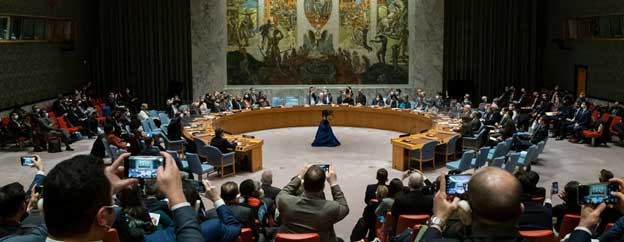Why Africa is Divided Over the Russia-Ukraine War?

NAIROBI, Kenya, Apr 12 (IPS) - While the West has closed its ranks in response to the Russian invasion of Ukraine, the response in Africa has hardly been uniform.
Following Russia’s military invasion of Ukraine on 24 February, various constituencies within the international community have reacted with a mixture of shock, anger, and trepidation as they ponder the invasion’s implications for international security.
Sub-Saharan Africa (SSA), long regarded as a marginal player in global politics, has been no exception, with Kenya notably issuing a strongly worded condemnation of Russia’s aggression at the United Nations Security Council (UNSC).
Since then, Senegal’s president Macky Sall, the current chair of the African Union (AU) and Moussa Faki, the chairperson of the African Union Commission (AUC) have both issued similar condemnation of Russia’s invasion, calling on the latter to ‘respect international law, the territorial integrity, and national independence of Ukraine’.
Despite the statements from Kenya and the AU, the African response has been hardly uniform, with most of the continent’s countries opting to stay mute – possibly for fear of aggravating Russia. Only 28 African states supported a United Nations General Assembly resolution on 2 March condemning the invasion, with 17 abstaining and one opposing the resolution.
The divide within the SSA region becomes even sharper when one considers that, even as Kenya spoke out strongly against the invasion, its neighbour Uganda abstained from the vote, ostensibly in honour of its ‘non-aligned’ stance in global affairs.
At the same time, the Ugandan president’s son and the country’s army commander, Muhoozi Kainerugaba, tweeted comments in which he expressed strong support for Russia’s invasion of Ukraine.
Globalised racism
More broadly, traditional roles in international politics have been reversed at least temporarily. Africa, long regarded as a synonym for senseless armed conflict and accustomed to being on the receiving end of condescending rhetoric and projects of conflict resolution, finds itself playing ‘peacemaker’ vis-à-vis its civilisational ‘superior’ – Europe.

Western journalists and academics – long steeped in analytical narratives that explain conflict on the basis of ethnicity and other primordial identity factors associated with ‘cultural backwaters’ like SSA and the Arab world – are struggling to explain the carnage, destruction, and displacement in Ukraine.
The current situation should pose as a grim reminder that conflict is fundamentally driven by greed, opportunism, and other materialist pursuits – rather than identity, culture, or atavistic factors.
While SSA has had its fair share of unsavoury, warmongering leaders, who were keen to exploit military power in pursuit of personal aggrandisement, few have been as blatantly dismissive of international opinion as Vladimir Putin.
At the same time, reports of African students attempting to flee from Ukraine and being barred from entering neighbouring countries on the basis of skin colour are a stark reminder that centuries after the end of slavery, racism is still a palpable reality in much of Europe and the western world.
The AU’s statement on 28 February, however, only condemned racism against Africans, even though racism towards Arabs and Caucasians has also been reported. This reflects the geo-provincial lens through which many on the continent regard the Russia-Ukraine conflict – and points to an enduring balkanisation based on racial identity in an era supposedly associated with greater globalisation.
Sub-Saharan relations with Russia
Africa is a large continent comprising 54 countries.
Therefore, any attempt to generalise their experience is inevitably fraught with analytical inaccuracy. Yet for many countries on the continent, Russia’s geopolitical imprint is minor compared to that of the other five permanent UNSC members.
Even as the United States and China loom large in the contemporary imagination, former colonial powers like Britain and France continue to exploit historical, linguistic, and cultural ties as a basis for some (admittedly waning) influence. Russia is just left to scrape the barrel.
With many of the regimes propped up by the defunct USSR having been replaced over the years, Russia’s claim to fame on the basis of Cold War nostalgia has faded and the country has had to develop a new repertoire and framework of relations based on security cooperation, trade and investment ties, and political solidarity (particularly at the UNSC).
Moreover, while some African countries are key importers of Russian agricultural products like wheat, SSA’s trade relationship with Russia is mostly based on exports from the former, rendering the region less dependent on such trade ties in comparison to countries in Europe. In short, Russia’s invasion of Ukraine and the global response poses a much greater threat to Europe, both economically and geopolitically, than it does to SSA.
What the conflict means for Africa
Against this background, Russia’s invasion of Ukraine has at least three implications for its relations with Africa going forward. First, it lends credence to the view that contemporary conflicts, be they inter-state or intra-state, are largely driven by material factors, occasionally masked by identity politics.
Second, the conflict reinforces the notion, long held in Africa, that regional crises are best resolved by regional actors in the neighbourhood of the conflict.
NATO’s and the EU’s strong response in support of Ukraine – even though Ukraine is not a member of either organisation – recalls the view, long promoted by SSA leaders particularly in the lead-up to the NATO-led military campaign that toppled former Libyan leader Gaddafi, that regional crises are best resolved by actors in the near neighbourhood. In other words: European solutions to European problems!
Therefore, the AU and sub-regional bodies like the Economic Community of West African States (ECOWAS) and the Inter-Governmental Authority on Development (IGAD) should expect less of a challenge when they insist on taking the lead in resolving conflicts within their region, while at the same time learning critical lessons from the swift action taken by NATO allies to protect ‘their own’.
Finally, the Russia-Ukraine conflict is a reminder that even in a world that is supposedly multilateral, international responses to political and economic challenges are moulded more by geo-strategic calculations than by philanthropic ideals.
The media, political, and diplomatic attention accorded to Ukraine during the invasion far exceeds that given to similar conflicts in SSA and other parts of the globe – and it is proof that this is indeed a world of every continent or sub-region for itself.
Martha Kiiza Bakwesegha-Osula is a Global Policy and Peacebuilding Advisor at the Life and Peace Institute in Nairobi, Kenya.
The views and opinions expressed in this article are personal and belong solely to the author and are not attributed to people, institutions and organisations that the author may be associated with in a personal or professional capacity. Any views or opinions are not intended to malign any religion, ethnic group, organisation or individual.
IPS UN Bureau
Follow @IPSNewsUNBureau
Follow IPS News UN Bureau on Instagram
© Inter Press Service (2022) — All Rights Reserved. Original source: Inter Press Service
 Global Issues
Global Issues